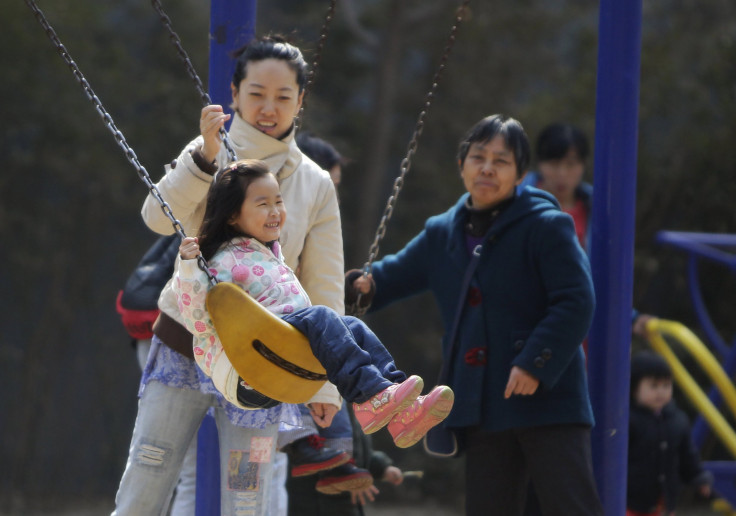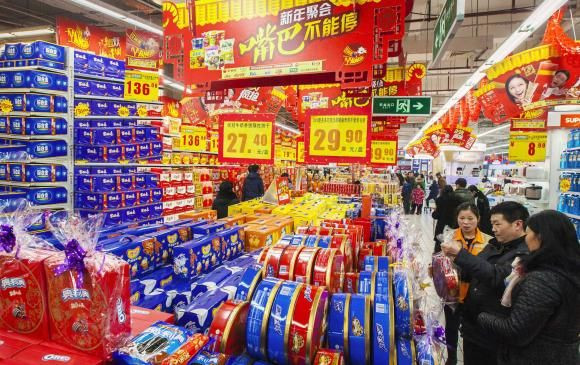China Scraps One-Child Policy To Stimulate Consumption And Investment During Economic Slowdown

SHANGHAI -- Scrapping China’s one-child policy after 35 years will be seen by many outside China as the end of a policy that infringed on freedom of choice – and led to well-documented cases of forced abortions and other abuses. An increasingly heated public debate on the issue inside China in recent years has also linked it to questions of reproductive freedom.
But the government’s move to allow every couple to have two children – two years after it allowed couples in which one partner was an only child to have two offspring – has more expedient goals in sight. As state media put it on Thursday, the move will “help tackle the aging population and promote balanced development” – and experts said it could also provide a massive boost to consumer spending and investment at a time of economic slowdown.
Concerns about the economic impact of the country’s low birth rate have led a number of entrepreneurs to speak out on the issue in recent years. James Liang, founder and CEO of Ctrip, China’s biggest travel website, who has written a book calling on the government to relax the policy, also wrote in The Paper on Thursday that the reform was "good news for the Chinese economy" and could represent a “big step” forward.
Based on a conservative estimate of an extra 2.5 million births each year, Liang said the economy could expect a consumption boost of some 75 billion yuan (around $12 billion) annually, and the change could also bring as much as $35 billion in annual investment in sectors including education and housing. He said this would provide a 0.5 percentage-point boost to China’s GDP – helping the nation get closer to its current growth target of 7 percent per annum (though economists predict a slightly lower growth target of some 6.5 percent may be set for next year).

The one-child policy reform would “unleash a pent-up desire to give birth, which has been restricted for so many years,” Shanghai news website The Paper said. With more than 100 million people of child-bearing age affected by the change, it added, China could see between 2.5 million and 8 million extra births a year from 2017 on.
The biggest growth engine in China’s economy in recent years, according to Liang, has come from Internet tycoons like Jack Ma of e-commerce giant Alibaba, and said China would depend increasingly on youthful entrepreneurs in the future. He said the country therefore needed to maintain “a certain level of growth” among its young population – and a larger population could also help attract more long-term investment from foreign investors drawn to China because of the size of its market.
For decades Chinese officials stressed that the one-child policy had benefited China’s society and economy by reducing the number of children born to poor families, thus enabling the country to lift hundreds of millions of people out of poverty, particularly in rural areas. Now, however, China faces the opposite problem – as The Paper put it on Thursday, birth rates are “exceptionally low”: China has around 19 percent of the world’s population, but only some 12 percent of annual births. The number of women aged 24 to 29 – prime child-bearing years in China – is also predicted to fall some 40 percent from 74 million to 41 million in the next decade, according to The Paper.
Since 2010, the number of young people entering the workforce has been declining, leading to labor shortages in some parts of the country -- despite a slowing manufacturing economy. And China’s aging population is also becoming an increasingly serious challenge: some major cities like Shanghai and Guangzhou already have a top-heavy population structure similar to that in developed Western economies like the U.S. – leading to an increasing burden on those of working age, and a shortfall in the nation's pension fund.
Some observers suggest the reform, which is expected to become law at the annual session of China’s legislature in March, was purposely announced after a four-day meeting of China’s top leaders, to provide some positive news for China’s citizens following the release of a series of negative economic indicators. China’s exports have slumped to a six-year low, manufacturing output is falling, and GDP growth fell to 6.9 percent in the last quarter – the first time it has dropped below 7 percent since early 2009.

Discarding a policy that's been unpopular with many makes political sense, analysts said. Perhaps for that reason, the government appears to have accelerated the process – earlier this year, many experts said the two-child policy reform might take another two years to introduce. The move is designed to show that the Chinese authorities can take decisive and effective action, in sharp contrast to their clumsy handling of a boom and bust on the country’s stock market, and the surprise devaluation of China’s currency, the yuan.
Nevertheless the policy could put more pressure on China’s social infrastructure – which is already struggling to keep up with the flow of tens of millions of rural migrants into the country’s cities over the past decade. The Paper acknowledged in an editorial that a higher birth rate could squeeze health and education services, and lead to public complaints. But, the paper argued, children are the “wealth of a nation,” adding, “the long-term return is far bigger than the short-term investment.”
Another potential plus for the nation is righting China’s skewed gender balance. Since many families, particularly in rural areas, still subscribe to the traditional Chinese belief that a son is more valuable than a daughter, many parents have, over the past two decades, aborted female fetuses, leading to a birth ratio of some 118 boys to every 100 girls.
But not everyone is heralding the move. Bringing up children in China’s overcrowded cities is expensive and stressful for many young urban couples, as readers writing in to The Paper’s comments section made clear: “It’s mainly the rich or the poor who want to have more kids – the middle classes basically don’t want to have children due to the high costs, and worries about education and quality of life.”
Another said, “It’s only the big bosses or old legislators who want to open up this policy– they can’t understand the pressure and costs of having kids for young people of marriageable age.” And a popular social media commentator who goes by the name “Homework book” gained 6,000 likes for a post on microblogging site Sina Weibo, in which he said the abolition of the one-child policy "is proof that the real estate market is in trouble – [so] they need to make us quickly have more kids and buy more houses!”
© Copyright IBTimes 2024. All rights reserved.





















